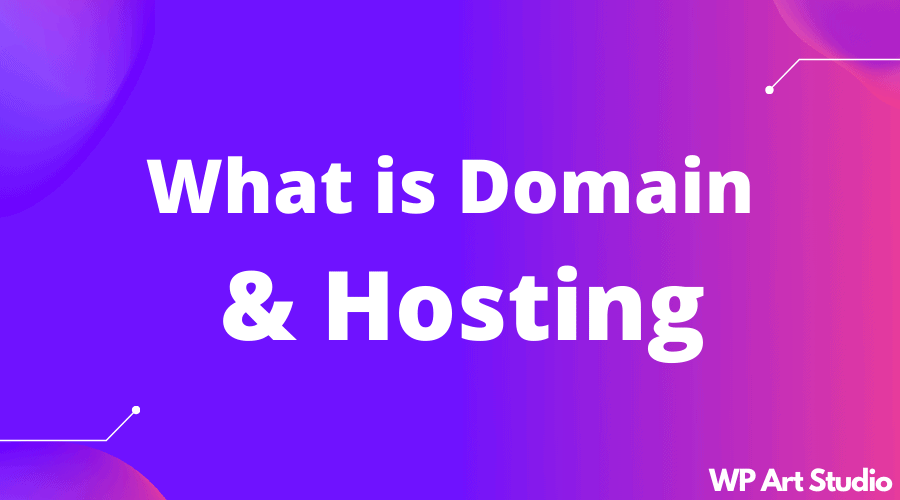We are often asked what is domain and hosting. And we are not clear about the domain and hosting. Domain and hosting are two different terms in the web sector. Maybe we heard these words many times. Domain and hosting may be very similar to newbies. But it’s not actually. The domain is the name and hosting is the space. And you need both to make your website live. In this article, I am going to explain Domain and Hosting in brief.

What is Domain?
In simple words, a domain name is your website name. If I say the number of registered domains it’s huge. Based on today’s date it’s 367 million registered domains on the web. So how can you find your website? Obviously, it should have a name right? Basically behind the domain name, it actually calls the IP address which is connected to this domain. A typical IP address format is 232.17.43.22. So Just think about the IP address. Isn’t it hard to remember? Of course, it is and that’s why the domain name was invented. Because it is easier to remember rather than remembering a long IP address.
Types of Domain
There are several types of domains. These are listed below:
1. Top-Level Domain
- .com.
This is the first high-level domain name extension. It’s a very popular high-level domain for the companies, websites, and emails by the mid-1990s
- .net
This is basically developed for institutions participating in the network systems such as web service providers or infrastructure firms etc.
- .gov
By extension so far you already guessed that this is related to education. I mean if you have an educational institution you can choose this extension.
- .edu
By extension so far you already guessed that this is related to education. I mean if you have an educational institution you can choose this extension.
- .mil
.Mil stands for Military shorthand, And this domain extension is specifically developed for the US military. The United States is the only country that has a top-level domain for its military.
- .org
.Org stands for Organization. It was specially developed for non-profit organizations. But Nowadays non-profits and profit enterprises, schools, and communities are also using this top-level domain.
2. Generic Top-Level Domain
Generic Top-Level Domain is also a category of Top-level domain. It has 4 main categories and totals 21 gTLD in the root zone. These are listed below.
- generic (.com, .info, .net, .org)
- sponsored (.aero, .asia, .cat, .coop, .edu, .gov .int, .jobs, .mil, .mobi, .tel, .travel)
- generic restricted(.biz, .name, .pro)
- infrastructure(.arpa)
3. Second-Level Domain
A second-level domain (SLD) is a domain that follows a top-level domain. Suppose .com is a top-level domain. And you have a brand called XYZ. Now if you connect your brand name with the top-level domain then it will finally be the second-level domain which is xyz.com
4. Third-Level Domain
A third-level domain is a domain that connects with the second-level domain and finally makes a sub-domain. Like if you have a domain called nike.com then the third-level domain or a subdomain will be like shop.nike.com
What is Hosting?
Hosting is a space with all the advanced tools and functionality you need to run a web application on the internet or server. It also manages many services that run on the web. These are the physical computer connected to the internet with lots of hard disks. You can manage your files, you can manage your emails along with all other functionalities. You can do a lot of stuff there. I can’t add that technical term here to complex it. As you know I always write for the newbie. But remember that you don’t need to be an expert on hosting management.
As a web developer or a simple website owner or a learner, You don’t have to know a bunch of options in hosting. Even if you want to run a simple website using WordPress then it will just take a few clicks on your server to install.
Types of Hosting?
Most of the hosting service providers offer different types of hosting. The price depends based on the space and other features provided by them. So you can choose your hosting package based on your need. Some hosting types are listed below.
Shared Hosting
Shared hosting is hosting when a web hosting provider hosts many websites on the same server. That means the same server is divided for multiple websites. There have some pros and cons over there. But still, it’s a good option for getting started. If you think about getting started with a blog website or a personal portfolio website then shared hosting is a good option. You can get shared hosting at a very affordable price.
WordPress Hosting
WordPress hosting is specially optimized for WordPress. It has many inbuilt features that can change your experience. Hosting providers set different types of features on WordPress hosting. Below are some of the common features that most of the hosting provider offers.
- Simple one-click WordPress installation that avoids all the manual stuff like creating a database then creating users and finally connecting users to the database. All you have to do is just a few clicks to install WordPress.
- In WordPress hosting, you will get your server optimized for faster loading. it will increase your speed page speed which ultimately helps to get ranking.
- As you know WordPress is serving millions of websites on the internet. So Security questions arise here. On your WordPress hosting, you will get high-security built-in by the hosting provider.
VPS Hosting
VPS hosting is a semi-dedicated hosting plan. It stands for the virtual private server. The website site which runs on a VPS plan has more resources than shared. It has its own partition with dedicated resources. It has more memory, storage, and processing power. it has also various plans based on the price.
If you have a site that needs resources more than shared hosting but still does not need that many resources which an enterprise-level web application needs then you may choose the VPS hosting plan. You can think about VPS as a bridge between Shared hosting and Dedicated hosting. You can take better benefits and control than shared hosting offers an expense less than large-scale management of a dedicated server environment.
VPS hosting plan is only for the person who is experienced with server management. You will be able to configure your own server with all the software you need. They will give you root access so that you can customize your server based on your need.
Dedicated Hosting
If you have enterprise-level web apps that have huge traffic and taking huge resources from the server then you should choose this hosting plan. Dedicated hosting means you have the entire server to yourself. On VPS, it also shares the server with other sites or apps but on dedicated hosting, you don’t have to share your server with other sites or apps. It is very expensive than the other hosting plans I described above. So if you have a medium size with average traffic then you don’t need to purchase this expensive hosting.
Cloud Hosting
In simple words, Cloud hosting is a server and network infrastructure. It has a single physical server that uses software to divide it into multiple virtual servers. Those virtual servers contain virtual machines.
The interesting thing is the price of cloud hosting. Most cloud hosting providers set the price in such a way that you have to pay only based on the uses. The more server resources you will use the more you have to pay.




